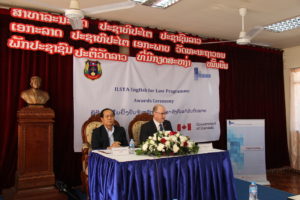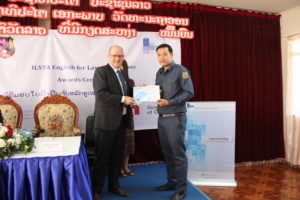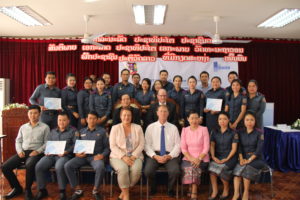Lao law professionals are honing their legal English skills thanks to a specialised multi-level law curriculum being delivered by the Institute for Legal Support and Technical Assistance.
The ILSTA English for Law Programme was launched in June 2016 starting with the training of 40 prosecutors from the Office of the Supreme People’s Prosecutor (OSPP). With support from the Government of Luxembourg, the programme has expanded and now trains more than 80 officials from OSPP, the Ministry of Justice, the People’s Supreme Court, the Ministry of Public Security and the State Inspection Authority.
During an awards ceremony on 24 November at the Prosecutor Research and Training Institute, fifteen prosecutors received certificates on successfully completing a six-month intensive English for law course. The top performing students in each class received an English for Law Dictionary.
Speaking at the awards ceremony, Mr John Connolly, Director of Communications of ILSTA, noted that, “proficient English language skills are vital for Lao government officials in order to coordinate with regional colleagues, keep up to date with latest developments in their sector, and to increase on-the-job learning opportunities. These needs necessitate the development of a longer-term strategy for English language learning within the Lao legal sector”
The standardised curriculum developed by ILSTA enables Lao legal professionals to continue to work full-time while they receive 6-hours of classroom study per week. The curriculum focuses on legal concepts and vocabulary as well as the development of generic skills and strategies for effective learning.
This is part of ILSTA’s holistic approach to support capacity development in the governance sector. With support from the Government of Canada, ILSTA is also training officials from the Anti-Money Laundering Intelligence Office (AMLIO) of the Bank of Laos with a specialised curriculum on Law, Finance and Banking. The classes are a forum for Lao officials to interact informally and develop knowledge and skills in their areas of work, with input from guest lecturers and presenters.




Comments are closed.